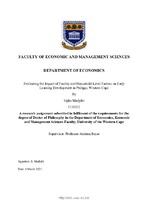| dc.contributor.advisor | Bayat, Amiena | |
| dc.contributor.author | Madyibi, Siphe | |
| dc.date.accessioned | 2021-08-23T09:11:06Z | |
| dc.date.available | 2021-08-23T09:11:06Z | |
| dc.date.issued | 2021 | |
| dc.identifier.uri | http://hdl.handle.net/11394/8383 | |
| dc.description | Philosophiae Doctor - PhD | en_US |
| dc.description.abstract | Early learning opportunities in South Africa are both inaccessible and unequal in quality due to facility and household-level factors. With minimal resources, Early Childhood Development (ECD) facilities in poor communities provide low-quality ECD services to children. Part of the reason that ECD facilities are under-resourced and of poor quality is their inadequate funding. The disparity in quality means that poor children may still lag behind children who have had access to high-quality, well-resourced ECD facilities. Beside facility-level factors, the process of early learning is also influenced by household factors. Studies have found that low-cost stimulations such as storytelling, singing and playing with household objects can be used as tools to promote early development within the confines of the household. | en_US |
| dc.language.iso | en | en_US |
| dc.publisher | University of Western Cape | en_US |
| dc.subject | Early learning | en_US |
| dc.subject | Early childhood development | en_US |
| dc.subject | Children’s Act of 2005 | en_US |
| dc.subject | Early childhood development facility | en_US |
| dc.subject | Philippi | en_US |
| dc.title | Evaluating the impact of facility and household-level factors on early learning development in Philippi, Western Cape | en_US |
| dc.rights.holder | University of Western Cape | en_US |

